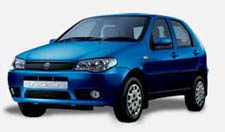Tata Motors, Fiat India joint venture to export Palio engines globally
24 Mar 2008
Mumbai: The joint venture between Fiat India and Tata Motors is being expanded to export Fiat Palio petrol and diesel engines.
The joint venture firm will sign a preliminary memorandum of understanding with Maharashtra state to double its plant capacity in Ranjangaon where Fiat India makes 100,000 Palio hatchback cars and 200,000 engines and transmissions in India.
The capacity augmentation will cater to the increased global demand for Fiat's engines.
The reduction in excise duty from 16 per cent to 12 per cent on small cars, proposed in Union Budget 2008-09, is expected to boost the demand for the Palio.
Moreover, as part of its plans in India, Fiat is looking to launch around four car models this year, including the Linea and the iconic Fiat 500. The Ranjangaon plant will produce the 1.3 litre and 1.9 litre multi-jet diesel engines, besides 1.2 and 1.4 litre petrol engines that are part of Fiat's design stable.
Engines from the Ranjangaon plant also find their way under the hood of Tata Motors' new Indica, and are may be used as the power packs aboard Fiat's Linea and Grande Punto, both of which are scheduled to be introduced into the Indian market later this year.
 The companies say that the capacity expansion has been undertaken targeting the international engine supply contract. Fiat is keen to supply its engines to a number of global manufacturers, and given the size of the Ranjangaon facility, capacity expansion is only logical for the plant, as it would support demand in both the domestic and international markets.
The companies say that the capacity expansion has been undertaken targeting the international engine supply contract. Fiat is keen to supply its engines to a number of global manufacturers, and given the size of the Ranjangaon facility, capacity expansion is only logical for the plant, as it would support demand in both the domestic and international markets.
Tata Motors has entered into a joint venture with Italian auto major Fiat to manufacture passenger cars, engines and transmissions. (See: Tata Motors signs car, engine joint venture with Fiat)
Fiat also has a similar arrangement with Maruti Suzuki, as part of Suzuki Powertrain India (SPIL), that manufactures and exports engines, both petrol and diesel, to the Suzuki's global locations. Fiat's diesel also powers the Maruti Suzuki Swift.
Industry analysts point out that engine manufacturing in India yields cost advantages in the range of 30 to 40 per cent, as compared to manufacturing units in Europe or the United States, primarily on account of cheaper material and labour costs.
View: Auto videos | Auto picture galleries




















